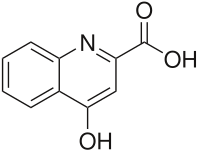
Photo from wikipedia
Kynurenic acid (KYNA) is an endogenous antagonist of N-methyl-D-aspartate and α7 nicotinic acetylcholine receptors that is derived from astrocytes as part of the kynurenine pathway of tryptophan degradation. Evidence suggests… Click to show full abstract
Kynurenic acid (KYNA) is an endogenous antagonist of N-methyl-D-aspartate and α7 nicotinic acetylcholine receptors that is derived from astrocytes as part of the kynurenine pathway of tryptophan degradation. Evidence suggests that abnormal KYNA levels are involved in the pathophysiology of schizophrenia. However, this has never been assessed through a meta-analysis. A literature search was conducted through Ovid using Embase, Medline, and PsycINFO databases (last search: December 2016) with the search terms: (kynuren* or KYNA) and (schizophreni* or psychosis). English language studies measuring KYNA levels using any method in patients with schizophrenia and healthy controls (HCs) were identified. Standardized mean differences (SMDs) were calculated to determine differences in KYNA levels between groups. Subgroup analyses were separately performed for nonoverlapping participant samples, KYNA measurement techniques, and KYNA sample source. The influences of patients' age, antipsychotic status (%medicated), and sex (%male) on study SMDs were assessed through a meta-regression. Thirteen studies were deemed eligible for inclusion in the meta-analysis. In the main analysis, KYNA levels were elevated in the patient group. Subgroup analyses demonstrated that KYNA levels were increased in nonoverlapping participant samples, and centrally (cerebrospinal fluid and brain tissue) but not peripherally. Patients' age, %medicated, and %male were each positively associated with study SMDs. Overall, KYNA levels are increased in patients with schizophrenia, specifically within the central nervous system. An improved understanding of KYNA in patients with schizophrenia may contribute to the development of novel diagnostic approaches and therapeutic strategies.
Journal Title: Schizophrenia Bulletin
Year Published: 2017
Link to full text (if available)
Share on Social Media: Sign Up to like & get
recommendations!